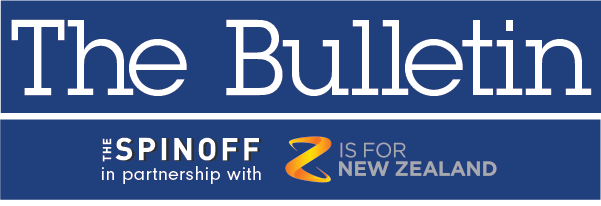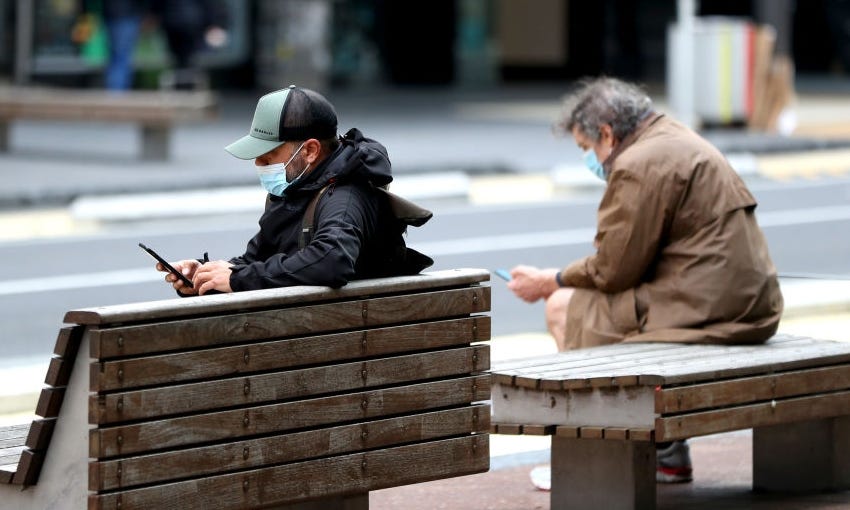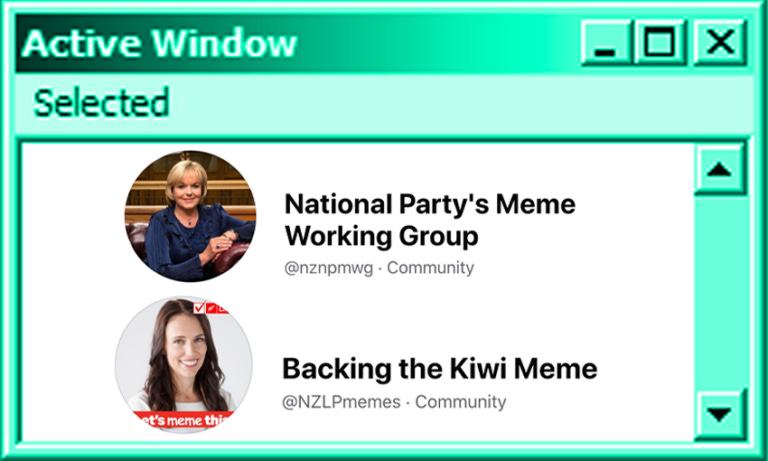Mandatory transport masks the new normal
It's the biggest change that we'll see between the start and the end of this current lockdown

Good morning and welcome to The Bulletin for Tuesday 25 August, by Alex Braae for The Spinoff. Presented in partnership with Z Energy.
In today’s edition: Alert levels extended until next Monday with new rules put in, managed isolation worker still hasn’t got test results, and Peters has new connection with Bad Boy of Brexit.

Image: People wearing masks while waiting for a bus on Queen St in Auckland (Getty Images)
The current alert levels will remain for another week at least, and even after that, things won't quite go back to how they were before. First of all - the top lines of the announcement from our live updates page: Auckland is staying in alert level three until the end of the weekend – 11.59pm this Sunday – with restrictions on mass gatherings to continue after the move down to level two. The rest of the country will stay in level two until the end of the week at least, and likely beyond. Part of the reason for that is a fear that if Aucklanders were suddenly released into a country with widespread mass gatherings at level one, new clusters could develop. The new alert levels will be reviewed again on September 6, a Sunday.
The gathering rules in Auckland are aimed at preventing new outbreaks with the move down to level two. They will be set at 10 people, with exceptions for funerals and tangihanga. Schools will be allowed to reopen, along with many businesses. The gathering rules will not apply to hospitality as such – a venue would be allowed to have more than 10 people inside at any given time, but socially distanced into groups no larger than 10 people.
The biggest change is the mandating of mask-wearing on public transport, to begin on Monday next week, and to apply at level two or higher. That will include ride-shares, taxis and planes too. One of the cases of community transmission announced yesterday came from an Auckland bus, so it is actually quite possible this will have an effect on preventing the spread of outbreaks. While mask-wearing is definitely a useful tool, there could be some problems with enforcing it, because of the availability and cost of masks. As Newshub reports, there have been hundreds of complaints about price gouging or unfair prices, with demand shooting up. Anecdotally, many stockists and makers are also struggling to fill orders for masks right now. An important point was made by the University of Otago's Dr Amanda Kvalsvig, who said:
“As described by the Prime Minister this afternoon, the new measures place a heavy reliance on individuals to own and carry a mask. There will be practical and cost barriers for many. At all times during Alert Level 2, masks need to be made freely available on public transport to ensure that no-one is disadvantaged."
However, scientists are largely backing the decision to make these calls. A range of voices have been collected by the Science Media Centre, who by and large agree that both the slight extension to the current alert levels, and the decision on masks, will help prevent the country from sliding back up the alert levels in future.
Finally, there will be many for whom it's difficult to hear that lockdown will continue a bit longer. One News reports the PM addressed that in her press conference yesterday, saying that it had been a "frankly terrible" year for the world as a whole, and not without serious challenges for this country, even if we are better placed than most. National leader Judith Collins also spoke about the extension, saying about the economic impact of the lockdown that "four days may not sound like a lot to people, but I've been in small business and the hospitality business, I know how tough it is."
A worker at a managed isolation facility – speaking on condition of anonymity – says they still haven't got their Covid test results back 10 days on. Stuff's George Block reports that the worker says three colleagues are also yet to get theirs back either. Strangely enough, he also says that there is no record of him being tested at all – a situation he describes as a "farce".
Foreign minister Winston Peters is in a spot of bother over a request for consular assistance from one of the so-called Bad Boys of Brexit. Aaron Banks, an architect of the Brexit campaign, reached out to Peters' office, to try and get a transit visa from New Zealand to Australia, reports the NZ Herald's Jason Walls. National's foreign affairs spokesperson Simon Bridges says it is "rare and notable" for the foreign minister's office to have any involvement in a consular assistance request, but a spokesperson for Peters said that Banks was merely referred to where he should go, with Peters' senior private secretary telling Banks to "let me know how you get on." Peters and Banks have been friends for several years, and are possibly campaign colleagues for the election.
The NZ Public Party has thrown significant money into their merger with Jami-Lee Ross's Advance NZ party, reports the NZ Herald's Jason Walls. Donations totalling about $65k were made over the month of August, from a company set up in the name of the Public Party's campaign director. One point about this new party which I'm not sure is widely known – the events that they draw big crowds to are generally ticketed, with a 'suggested koha' – a recently cancelled event in Whanganui had the recommended price of $20 per person, for example. So that could be one explanation for where the money's coming from.
The Financial Markets Authority has warned that passive Kiwisaver funds are effectively little cheaper than active funds, in terms of fees. Business Desk's (paywalled) Dan Brunskill reports the findings come against what might have been expected – and there is also a pretty blurry line between what constitutes active and passive management. The report found "a marginally stronger link between the fees charged by managers who actually delivered, rather than just purported to have, active management," but said that said relationship was "far from conclusive."
More than 100 wastewater treatment plants are currently breaching their resource consent conditions, reports Radio NZ's Rachel Thomas. There's very little enforcement against discharging wastewater into freshwater against consents, which means it sort of just... happens... all the time. A new agency, called Taumata Arowai, will take oversight over sewage in two years, but even when that happens, regional councils will continue to be the ones with enforcement responsibilities.
In a series of victim impact statements, the Christchurch mosque shooter has been told that he failed to break the spirit of the Muslim community. Stuff has collated many of the stories told on the first day of sentencing, with family members and survivors of the attacks speaking directly to the gunman.
And a bit of feedback about life sentences: Reader Matthew got in touch to provide a clarification about a point made in yesterday's Bulletin, about what sort of sentence the Christchurch mosque shooter may receive. His reply is as follows:
The sentence for murder is nearly always life imprisonment (except in very limited circumstances) and the sentence for the terrorist will be one of life imprisonment with a minimum period of imprisonment at least 17 years (because the murders occurred as part of a terrorist act). Although, as you point out, he may be required to serve a full life sentence (i.e. never be eligible for parole). Alternatively, he may have a longer minimum period of imprisonment imposed of, for example, 30+ years (and not be eligible to be considered for parole until 2050 or beyond).
I think the point is an important one because there is, I think, a public misconception regarding sentencing and particularly murder sentencings. Often it will be said that the murderer “only got 12 years” when invariably what has happened is they have been sentenced to life imprisonment (and will be subject to that sentence for life) but will first be considered for parole after 12 years (and of course may not get it).
Got some feedback about The Bulletin, or anything in the news?
Drop us a line at thebulletin@thespinoff.co.nz

Right now on The Spinoff: Dr Siouxsie Wiles outlines why the elimination strategy continues to be New Zealand's best bet. Madeleine Chapman uses memes to ask why Trump is so obsessed with NZ right now. Michael Steedman and Dr Hirini Kaa write about the layers of pain and hope underneath a new memorial on the grounds of Auckland University. Julie Cullen looks at digital skill education, and whether it really needs to involve devices in classrooms. Emily Writes discusses how to accept when someone explains to you that you're wrong, and why we're often afraid of being told that. Steve O’Connor writes about how consumers and the environment are paying for our "broken electricity market". Stewart Sowman-Lund speaks to the anon creators of a pair of meme pages that will be battling throughout the election. And the last regular season episode of Youth Wings is here, focusing on a leader of the Young Nats.
For a feature today, a remarkably clear-sighted look at a wildly overhyped piece of technology. The Correspondent has looked into the potential uses of blockchain, and why something that was everywhere a few years ago doesn't seem to have really gone anywhere. The conclusion is basically that it's a wildly inefficient solution in search of a problem. Here's an excerpt:
Take My Care Log, another one of those award-winning experiments, this time in maternity care. All Dutch people with a newborn baby are allocated a certain amount of maternity care. Just like the children’s aid package in Zuidhorn, this was a bureaucratic nightmare, but now there’s an app on your smartphone where you can log how much care you have received and see how much you have left.
The final report shows that My Care Log doesn’t use any of the features that make blockchain so unique. A number of third parties were identified beforehand as exclusive miners: in other words, they have the right to veto any maternity care data logged. Better for the environment and in accordance with privacy regulations, the report notes. But wasn’t that the whole point of blockchain, that you could do without these trusted third parties? So what are they doing here?
If you ask me, they’re building a completely normal, run-of-the-mill database, but extremely inefficiently. Once you’ve cut through all the jargon, the report turns out to be a boring account of database architecture. They write about a distributed ledger (that’s a shared database), about smart contracts (that’s an algorithm) and about proof of authority (that’s the right to veto whatever is entered in the database).
One more piece about the Wellington Phoenix on the conclusion of what was one of the most unusual seasons any team has had in any sport: The NZ Herald's (paywalled) Jason Pine followed the team more closely than most as a commentator, and assesses what went unexpectedly right, and why in the end it wasn't enough. Just to give you an outline of that season – the Nix lost four in a row at the start, then went on a storming unbeaten run to come close to topping the table, then had to spend months across the Tasman because of Covid. And they did it all with a dreadfully depleted roster and a new coach. Had they come through and won the competition, it would have been the sort of stuff they make sports movies out of.
That's it for The Bulletin. If you want to support the work we do at The Spinoff, please check out our membership programme




